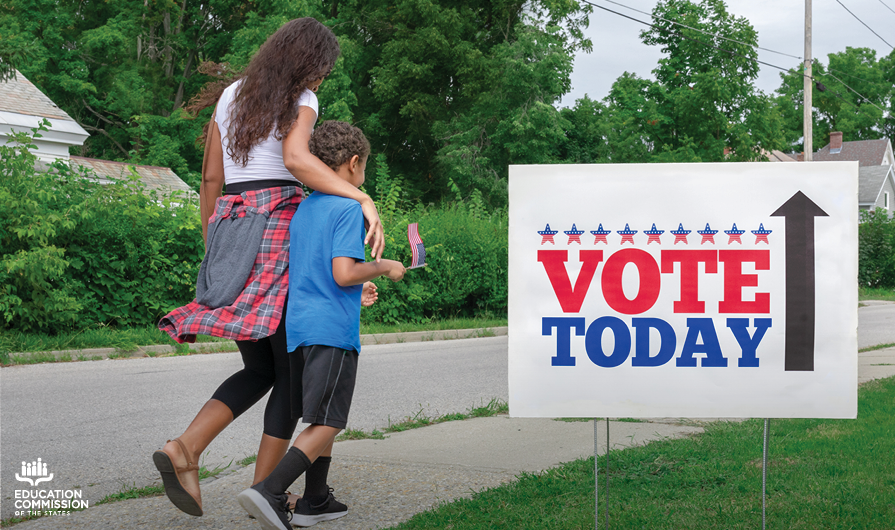We track state-level elections each cycle to monitor new leadership and its potential impact on education policy. With new governors, state legislators and education leaders across the country, we can expect changes for students and families across the country after the 2024 elections.
Governors
Eleven states — Delaware, Indiana, Missouri, Montana, New Hampshire, North Carolina, North Dakota, Utah, Vermont, Washington and West Virginia — held gubernatorial races. We tracked major party platforms in each of these races. Read our companion post in this election series for more information on those platform trends.
The newly elected governors in Delaware, Indiana and New Hampshire (as well as Vermont incumbent Gov. Phil Scott) each have the authority to directly appoint the chief state school officer. And as noted in our pre-elections coverage, 10 of these 11 states (all but Utah) have governance structures where the governor also appoints at least one member to the state board of education.
State Legislative Elections
With 5,508 seats in 43 House chambers and 42 Senate chambers including the unicameral Nebraska state legislature up for election, the changes in state legislatures will heavily influence education policy.
Some of the authorities that the newly elected or re-elected state legislators will have include creating a policy structure for public schools through legislation; determining budget allocations for public schools and state education departments; and ensuring that specific student populations are receiving equitable and adequate services and supports.
Prior to this year’s election, Republicans controlled 60 chambers to Democrats’ 39; and the Minnesota Senate evenly was split between the Republican and Democratic-Farmer-Labor Party. This amounted to 23 Republican trifectas — where the state house, senate and governor’s office are all controlled by a single party — as well as 17 Democratic trifectas and 10 states with divided governments. Notably, Pennsylvania was the only state Legislature with split control between the legislative chambers in 2024.
While many races have yet to be called, as of Nov. 19, 2024, only the Michigan House is set to change party leadership with Republicans gaining control, making Michigan and Pennsylvania the only states with split legislative chambers. Generally, Republicans made gains in legislative party strength, though Democrats are on track to have ended Republican supermajorities in North Carolina and Wisconsin. It appears that Republicans have ended Democratic supermajorities in Colorado and Vermont.
Elsewhere, the Democrats regained a one-seat majority in the Minnesota State Senate with a victory in a special election. Pending recounts, the Minnesota State House is currently tied. Alaska’s House of Representatives election resulted in no numerical majority and will be governed by a power-sharing agreement. The Arizona Senate and Maine House of Representatives have yet to be called, pending recounts.
And with no party changes in the 11 executive office races, the historically high number of state leadership trifectas appears to hold steady for 2025. As of publication, these elections appear to result in 23 Republican trifectas, 15 Democratic trifectas and 12 states with divided governments.
Chief State School Officers
In the four states with elections for chief state school officers, two new partisan and two incumbent nonpartisan executives were elected.
In Montana, Republican Susie Hedalen will succeed longtime State Superintendent Elsie Arntzen, who was term limited. Hedalen’s campaign for state superintendent focused on collaboration with lawmakers and state agencies, strengthening family engagement and reviewing the state’s school funding formula.
In North Carolina, the state superintendent role will flip parties as Democrat Mo Green is set to succeed State Superintendent Catherine Truitt, who lost in the Republican primary earlier this year. Green’s priorities for students in the Tarheel State include increasing funding, improving early academic interventions, raising educator compensation and supporting students.
In the nonpartisan races in North Dakota and Washington, both incumbent candidates retained their seats. North Dakota Superintendent Kirsten Baesler’s campaign emphasized local control, preparing students for life after graduation and ensuring teachers are paid well without increasing property taxes. Washington Superintendent Chris Reykdal similarly advocated for increased educator compensation and local control while emphasizing fully funding education, mental health services and modernizing graduation requirements, including expansion of career and technical education opportunities.
State Boards of Education
The state boards of education elections in nine states and the District of Columbia will also greatly impact education policymaking, especially as some of these boards either confirm or directly appoint their state’s chief state school officer.
- Alabama: Voters decided on four partisan districts out of nine, which resulted in the reelection of two Republican incumbents and two new Republican members in open seats previously held by other Republican members.
- Colorado: Voters decided on four partisan districts out of nine with two new members elected to open seats that continued their respective party control. A Republican and a Democrat were elected in two open seats and one Republican and one Democrat incumbent each retained their seats.
- Kansas: Voters decided on five partisan districts out of 10 and incumbent Democrats held onto two of the seats while the three other seats will go to newcomers. If unofficial results hold, two seats will have flipped party control; but the board’s current Republican majority will not change.
- Michigan: Voters decided on two of eight total partisan seats, resulting in two incumbent Republican members elected.
- Nebraska: Voters decided on nonpartisan representatives for four out of eight districts; all four seats are new to the board.
- Nevada: Voters decided on four nonpartisan positions; two incumbents were elected, and one new member was elected to an open district. As of Nov. 11, 2024, the election in District Three has not been called.
- Ohio: Voters decided on six out of 11 nonpartisan district seats, and no incumbents ran, which resulted in six new members.
- Texas: Voters decided on eight partisan districts out of 15 total seats resulting in five incumbents and three new board members.
- Utah: Voters decided on eight partisan seats out of 15 total seats resulting in four incumbents and four new members.
- The District of Columbia also held state board elections, and four incumbents and one new member were elected.
Ballot Measures
Voters acted on 16 ballot measures across 14 states on topics including funding, school choice and assessments. Here are the results:
Passed:
- Alabama Amendment 1 grants the Franklin County Board of Education authority to provide for the distribution of any proceeds or interest generated by lands or natural resources within Walker and Fayette Counties.
- Arkansas Issue 1 allocates lottery proceeds to vocational technical scholarships and grants.
- Colorado Proposition KK authorizes a tax on firearms to fund mental health services and school safety programs.
- California Proposition 2 allocates $10 billion in state bond funds for upgrading school construction.
- Indiana Question 1 removes the state superintendent of public instruction from the gubernatorial line of succession.
- Massachusetts Question 2 eliminates the requirement that students pass the Massachusetts Comprehensive Assessment System in order to graduate.
- Nebraska Referendum 435 repeals a measure that allocates $10 million for parents to spend on private education expenses.
- New Mexico Bond Question 1 authorizes about $19 million for capital expenditures for academic, public school, tribal and public library resource acquisitions.
- New Mexico Bond Question 3 authorizes about $230 million toward funding for public higher education institutions, special public schools and tribal schools.
- Rhode Island Question 2 authorizes $160.5 million for capital improvements to higher education facilities.
- Utah Amendment B raises the cap on annual distributions from the State School Fund for public schools from 4% to 5%.
Failed:
- Colorado Amendment 80 would have included the right to school choice in the state constitution.
- Florida Amendment 1 would have required members of district school boards to be elected with partisan affiliations. The state requires at least 60% of the vote to pass ballot measures.
- Kentucky Amendment 2 would have enabled the legislature to introduce future legislation that would allow public funds for charter schools and potentially private school vouchers.
- Missouri Amendment 5 would have authorized gambling operations in the state to grant additional gambling licenses and use the revenue for early childhood literacy programs.
- Nevada Question 1 would have amended the state constitution to transfer oversight of higher education from the board of regents to the state legislature.
You can find a quick overview of this year’s elections results in our 2024 elections infographic. With the elections behind us and the legislative session quickly approaching, remember that we are ready with resources to help stakeholders navigate the outcomes.









